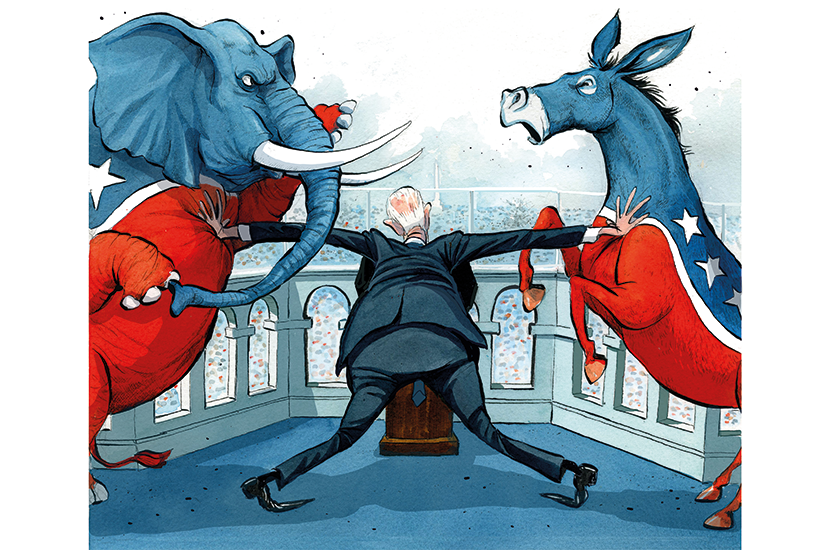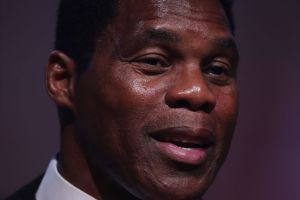Having won more votes than any presidential candidate in American history, Joe Biden might have hoped for a triumphant entry into Washington. Instead, he traveled to the inauguration in a private plane to deliver his speech to more members of the National Guard than guests. A combination of the pandemic and security fears ruined normal proceedings: the event had become a target, crowds too great a risk.
The emptiness embodies the problem Biden needs to overcome: not just the spats between left- and right-wing politicians, but the unraveling of trust in American politics. His challenge goes beyond governing. It is the question of how to unite the country — or, at least, how to repair the social fabric so that the scenes of the past few months are remembered as a freak incident in US history, rather than the start of a new, dangerous era.
If you were to hand-pick the political hero America needs in these fragile times, the gaffe-prone 78-year-old wouldn’t seem the obvious first choice. Much of Biden’s political past is defined by failure and rejection. After his surprise Senate victory in 1972 — when, aged 29, he beat establishment Republican J. Caleb Boggs for the seat in Delaware — he had not one but two failed bids for the presidency. Even Barack Obama, whom he served as vice-president for eight years, made it pretty clear that he wanted Hillary Clinton to succeed him in 2016.
Former senator Ted Kaufman once said that his friend Biden was the ‘unluckiest’ and ‘luckiest’ person he knew; the former referring not just to political but personal tragedies, including the loss of Biden’s first wife and his daughter in a car accident; the latter a reference to having ‘things happen to him that are just absolutely incredible’.
The same paradox might sum up Biden’s position at the start of 2021. He has become president when more than 3,000 Americans a day are dying of COVID. Last week, the FBI circulated a bulletin identifying ‘partisan political grievances’ as the greatest domestic terrorism threat. It’s hard to think of a recent time when things have looked bleaker.
Amid turmoil there is hope, however. American pharma has produced two COVID vaccines — Pfizer and Moderna — and the US ranks in the top five countries for the rate at which it’s vaccinating. The pending approval of the Johnson & Johnson vaccine may be a game-changer: it only requires one dose and can be stored at fridge temperatures. Healthcare workers will be able to go door-to-door in rural America, inoculating the most vulnerable. The death toll may soon start plummeting while Biden oversees one of the fastest economic recoveries in history.
Should this happen, what would Biden do? Wield his power in Congress to hammer home a Democratic counter-revolution, or to extend the hand of friendship across the political aisle? His first major piece of legislation — the $1.9 trillion COVID stimulus package — suggests he’s going to try for consensus. It’s a mixed bag of bipartisan measures with another round of stimulus payments, which will have support from a number of Republican representatives. There are also some trademark left-wing policies, including a $15 per hour federal minimum wage. At a time of huge unemployment, Republicans will struggle to swallow an ‘American Rescue Plan’ that they believe will further hinder job growth.
Biden insists he’ll work with the GOP to deliver a bill with Republican support. There are early indications that this is a genuine offer. He was considering appointing Democratic senator Chris Coons as secretary of state but has left his confidant in the Senate to act as his ‘whisperer’ to the GOP. Coons has good relationships across the aisle, referring to his colleagues as ‘family’.
‘We need a Republican party,’ Biden said after the Capitol riot. ‘We need an opposition that is principled and strong.’ But some Democrats have other ideas. Behind the scenes, there is talk of pulling levers through the Senate Budget Committee — chaired by the divisive Bernie Sanders — to ram through left-wing legislation on a simple majority vote.
After the Democrats’ victory in Georgia for both Senate seats, many in the party want to use their control of Congress to maximum effect and follow up a defeat of Trump with a purge of his supporters. Debbie Stabenow, a Democratic senator for Michigan, recently offered her own definition of how to unify America. ‘To have real healing,’ she said, ‘you have to have accountability and justice’. It sounded a lot like retribution under the guise of impartiality.
House Speaker Nancy Pelosi has also pointed the finger at Republican representatives who she believes instigated the attack on the Capitol. She brought forward impeachment proceedings against Donald Trump immediately. Biden, however, has not followed suit. He reserves his judgment for the chaos at Capitol Hill for the ‘small number of extremists dedicated to lawlessness’ and for Trump himself. He has encouraged the Senate to focus their minds on the ‘other urgent business of this nation’. His response is more measured: aware of the grave seriousness of what took place but also how much worse the situation could become if that ‘healing’ is not allowed to begin.
There’s no guarantee Biden will continue to hover above the political fray, or that he will take the more conciliatory path and try to win over the millions of voters who were told (and still believe) that the election was stolen, that the system doesn’t work. To do that would require some recognition of what Trump broadly got right. Perhaps this isn’t as difficult as it sounds: Biden has already framed his stimulus package as an extension of Trump’s last such bill. He does not seem intent on wiping out centerpieces of Trump’s legislative legacy: he wants to keep tax breaks for lower and middle income families. Criminal justice reform will stay.
Trump’s trademark foreign policy also looks safe: a more aggressive stance on China. Biden isn’t making any ‘immediate moves’ to roll back tariffs, and the return of Kurt Campbell — who served in the Obama administration — as Asia tsar makes it unlikely that Trump’s tougher position will vanish. Biden’s choice for secretary of state, Antony Blinken, agrees with the Trump administration’s classification of the treatment of the Uighur minority group as genocide. Yes, Biden’s style is bound to involve more international cooperation and less social media antagonism, but the COVID crisis has raised alarm about China’s growing influence, and Biden is not going to ignore that simply to disassociate from Trump.
Still, America is set for a helping of left-wing policy over the next few years, though Biden insists his center-leftism will define the party, not the progressive sect. Perhaps this is the most persuasive reason for Biden to seek a unifying path: his sense of self-preservation. Gone are the days of Democratic supermajorities. The Senate is split 50-50 and the party’s lead in the House is dwindling: it’s as close as American politics gets to a hung parliament. Having allies in the GOP will help him get his big-ticket items through. He may well find more than a few shellshocked Republicans who are now willing to seek common ground.
‘The refusal of Democrats and Republicans to cooperate with one another,’ said Biden after his election victory, isn’t ‘some mysterious force beyond our control. It’s a decision, a choice we make’. The most powerful break from Trumpism and from the woke wing of his own party would be to end the hyper-partisan polarization and tribal warfare that has blighted Washington for years. For a lifelong moderate and pragmatist like Biden, there is a center ground to be found. With the country’s cohesion dangling on a cliff edge, and many eager to see what happens when it tips over, it cannot be found soon enough.
This article was originally published in The Spectator’s UK magazine. Subscribe to the US edition here.


















